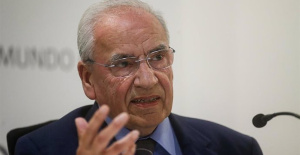Explains that the damage must be compensated even if the company did not have "reckless action"
MADRID, 8 Dic. (EUROPA PRESS) -
The Supreme Court (TS) has confirmed the almost 130,000 euros in compensation for the owner of a bar who lost an eye due to the explosion of a beer bottle, considering that it was an "unusual" event whose consequences must be repaired even though the responsible company did not have any "reckless actions".
The events date back to August 2015, when one of the beer bottles that had just been supplied to him, while still inside the transport box, exploded. One of the crystals hit him in the eye, which he ended up losing.
For this reason, the man demanded compensation of 152,877.12 euros from the brewery as civil liability, but the company refused, claiming that the product was not defective because it had passed all quality controls. Thus, he maintained that the bottle could have exploded for reasons that were not attributable to him, such as transportation, custody by the distributor and even manipulation by the injured party himself.
Initially, a court of first instance in Barcelona agreed with the brewery, rejecting the man's claim, considering that "there are doubts about how the explosion occurred" without proving "reckless action" on the part of the company.
In this sense, he explained that "the emergency report states that the accident occurred while washing some bottles." In fact, he pointed out that, "according to the defendant's expert, the injury can only be explained by an impact or falling bottle."
The bar owner appealed and the Barcelona Court ruled in his favor, setting compensation of 127,927.12 euros by placing the legal problem in the civil liability regime for defective products, which "disregards the fault or negligence of the manufacturer or importer." , based on the liability derived from "damage caused by products due to the lack of safety that can be expected."
To this, the Provincial Court added that, according to three witnesses, the man was eating at the same table as a regular customer when the beer delivery man arrived. He got up to serve him, the delivery man left the case of beer on the bar and he took it and left it on top of the refrigerator, which was right between him and the bar. While the delivery man was counting the money he had given him, one of the bottles exploded.
This second court also pointed out that even if the emergency report were taken into account "a beer bottle should not explode just because it was washed under the tap", which is why it concluded that "it would also be treated as of an unusual and anomalous explosion".
Not satisfied with that second ruling, the brewery went to the Supreme Court, which is aligned with the Court of Barcelona, determining that the damages derived from personal injuries caused by a defective product, to someone who acts with a purpose that falls within its commercial activity , business, trade or profession, are compensable.
The Supreme Court explains that the legal problem to be clarified is the regime applicable to the case. The brewery maintained that it was the general non-contractual liability included in the Civil Code, and the European directive for the defense of consumers and users could not be used by analogy, which would require proving culpable behavior to agree on compensation.
Although the court of first instance agreed, the Barcelona Court redirected it to the community standard, something with which the Civil Chamber of the TS agrees because, even though it is directed at consumers and users, "it does not exclude coverage of personal injuries suffered by those who use the defective product within the framework of a professional or business activity".

 Exploring Cardano: Inner Workings and Advantages of this Cryptocurrency
Exploring Cardano: Inner Workings and Advantages of this Cryptocurrency Seville.- Economy.- Innova.- STSA inaugurates its new painting and sealing hangar in San Pablo, for 18 million
Seville.- Economy.- Innova.- STSA inaugurates its new painting and sealing hangar in San Pablo, for 18 million Innova.- More than 300 volunteers join the Andalucía Compromiso Digital network in one month to facilitate access to ICT
Innova.- More than 300 volunteers join the Andalucía Compromiso Digital network in one month to facilitate access to ICT Innova.-AMP.- Ayesa acquires 51% of Sadiel, which will create new technological engineering products and expand markets
Innova.-AMP.- Ayesa acquires 51% of Sadiel, which will create new technological engineering products and expand markets The Community will provide facilities and support to the Bullfighting Prize with the help of the Toro de Lidia Foundation
The Community will provide facilities and support to the Bullfighting Prize with the help of the Toro de Lidia Foundation Page will contact the bullfighting sector to create, from C-LM, Bullfighting Awards that will have national reach
Page will contact the bullfighting sector to create, from C-LM, Bullfighting Awards that will have national reach Urtasun, on eliminating the National Bullfighting Award: "The majority of Spaniards support the decision I have made"
Urtasun, on eliminating the National Bullfighting Award: "The majority of Spaniards support the decision I have made" Alfonso Guerra sees Sánchez in an "autocratic" drift and accuses him of generating division "between the two Spains"
Alfonso Guerra sees Sánchez in an "autocratic" drift and accuses him of generating division "between the two Spains" How Blockchain in being used to shape the future
How Blockchain in being used to shape the future Not just BTC and ETH: Here Are Some More Interesting Coins Worth Focusing on
Not just BTC and ETH: Here Are Some More Interesting Coins Worth Focusing on The Generalitat calls for aid worth 4 million to promote innovation projects in municipalities
The Generalitat calls for aid worth 4 million to promote innovation projects in municipalities UPV students design an app that helps improve the ventilation of homes in the face of high temperatures
UPV students design an app that helps improve the ventilation of homes in the face of high temperatures Ivace and promotes a less invasive device for the early detection of prostate cancer
Ivace and promotes a less invasive device for the early detection of prostate cancer Valencia unanimously approves the ordinance to allocate spaces to test innovative initiatives
Valencia unanimously approves the ordinance to allocate spaces to test innovative initiatives A million people demonstrate in France against Macron's pension reform
A million people demonstrate in France against Macron's pension reform Russia launches several missiles against "critical infrastructure" in the city of Zaporizhia
Russia launches several missiles against "critical infrastructure" in the city of Zaporizhia A "procession" remembers the dead of the Calabria shipwreck as bodies continue to wash up on the shore
A "procession" remembers the dead of the Calabria shipwreck as bodies continue to wash up on the shore Prison sentences handed down for three prominent Hong Kong pro-democracy activists
Prison sentences handed down for three prominent Hong Kong pro-democracy activists ETH continues to leave trading platforms, Ethereum balance on exchanges lowest in 3 years
ETH continues to leave trading platforms, Ethereum balance on exchanges lowest in 3 years Investors invest $450 million in Consensys, Ethereum incubator now valued at $7 billion
Investors invest $450 million in Consensys, Ethereum incubator now valued at $7 billion Alchemy Integrates Ethereum L2 Product Starknet to Enhance Web3 Scalability at a Price 100x Lower Than L1 Fees
Alchemy Integrates Ethereum L2 Product Starknet to Enhance Web3 Scalability at a Price 100x Lower Than L1 Fees Mining Report: Bitcoin's Electricity Consumption Declines by 25% in Q1 2022
Mining Report: Bitcoin's Electricity Consumption Declines by 25% in Q1 2022 Oil-to-Bitcoin Mining Firm Crusoe Energy Systems Raised $505 Million
Oil-to-Bitcoin Mining Firm Crusoe Energy Systems Raised $505 Million Microbt reveals the latest Bitcoin mining rigs -- Machines produce up to 126 TH/s with custom 5nm chip design
Microbt reveals the latest Bitcoin mining rigs -- Machines produce up to 126 TH/s with custom 5nm chip design Bitcoin's Mining Difficulty Hits a Lifetime High, With More Than 90% of BTC Supply Issued
Bitcoin's Mining Difficulty Hits a Lifetime High, With More Than 90% of BTC Supply Issued The Biggest Movers are Near, EOS, and RUNE during Friday's Selloff
The Biggest Movers are Near, EOS, and RUNE during Friday's Selloff Global Markets Spooked by a Hawkish Fed and Covid, Stocks and Crypto Gain After Musk Buys Twitter
Global Markets Spooked by a Hawkish Fed and Covid, Stocks and Crypto Gain After Musk Buys Twitter Bitso to offset carbon emissions from the Trading Platform's ERC20, ETH, and BTC Transactions
Bitso to offset carbon emissions from the Trading Platform's ERC20, ETH, and BTC Transactions Draftkings Announces 2022 College Hoops NFT Selection for March Madness
Draftkings Announces 2022 College Hoops NFT Selection for March Madness























